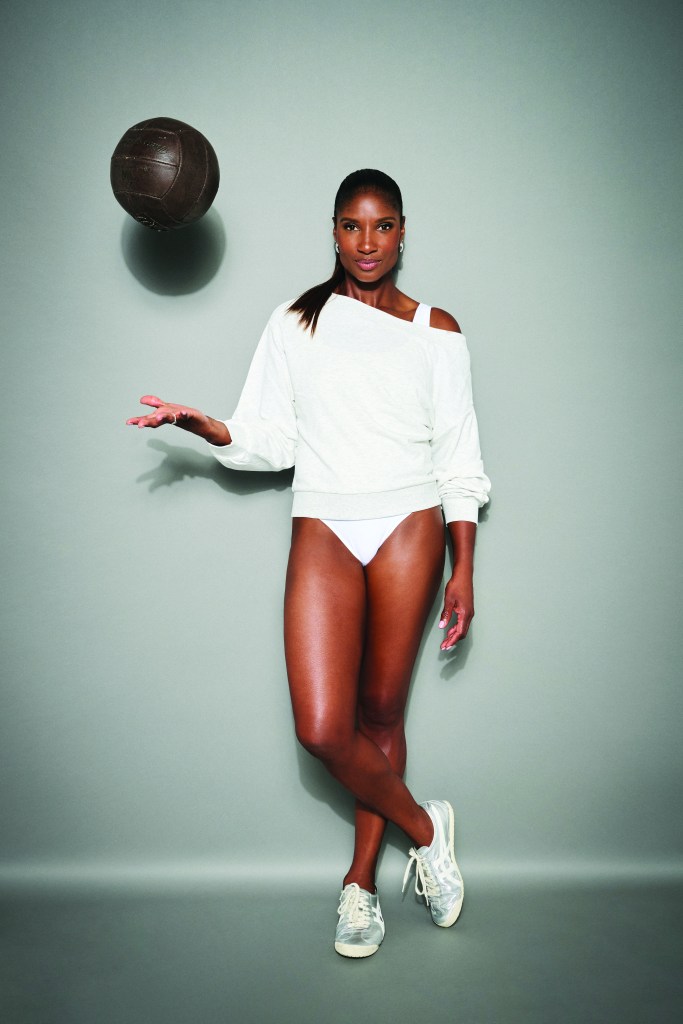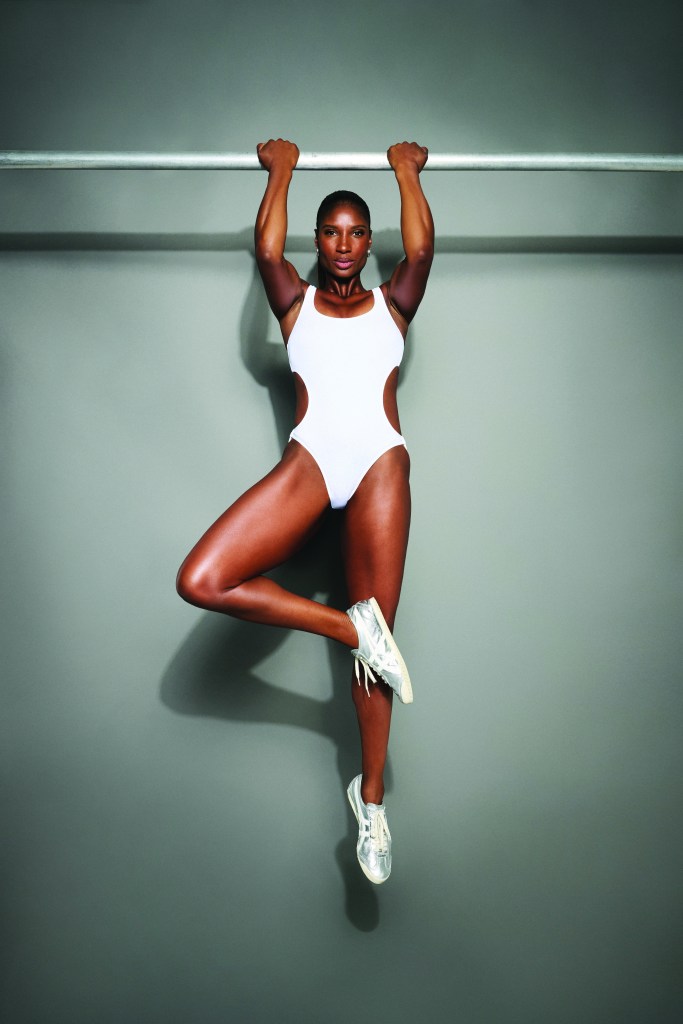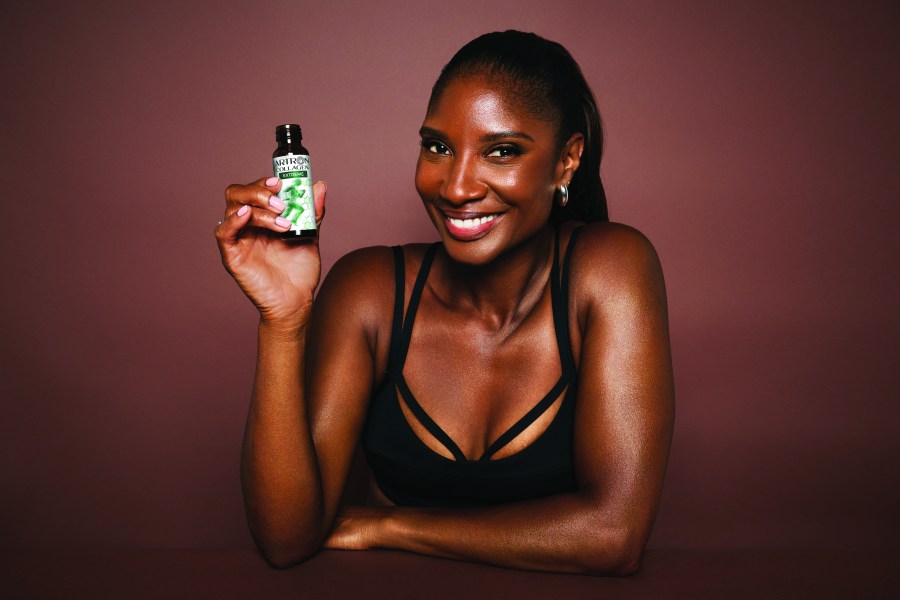Sporting legend Dame Denise Lewis, 52, tells us how she works out to feel well, plus why it’s so important for her to support and inspire a new generation of athletes.
Words: Joanna Ebsworth | Photography: Elisabeth Hoff
When Denise Lewis attends the one-day London Athletics Meet this July to watch the likes of Keely Hodgkinson and Dina Asher-Smith compete, she will be observing the action from a very different seat. After 15 memorable years in the BBC Sport commentary box, the Olympic gold medallist left viewers stunned during last year’s live coverage of the Paris 2024 Olympics when she announced she would be hanging up her microphone so she could take on her new role as the president of UK Athletics to ‘develop and help the sport that’s been so amazing to me’. However, while the heptathlon legend tells us she is enjoying the change and challenge – and is already making great strides by helping to prepare London’s bid to stage the 2029 World Athletics Championships – she admits it’s taken her some time to get used to.
‘It was scary to leave the BBC when I’d worked there for so long, and it was a hard decision: one I wish I didn’t have to make,’ admits Lewis, referring to suggestions that continuing in both roles might have presented a potential conflict of interest. ‘I think the enormity of missing my team at the BBC probably won’t hit me until the start of the outdoor athletic season, because we’ve had such a fantastic time over the years. But when the members of UK Athletics elected me to become president, it was almost like a call to action. It felt fitting for me to accept that position, along with all the responsibilities that come with it, and give back to the sport that has given me everything. Everything! It gave me direction as a child, purpose through my teens and recognition in my field amongst the British public, so I particularly want to continue that inspiration for the next generation, whether it’s at grassroots level or for our world-class athletes. I just want to make a difference, and I’m hoping the experience will be an exciting one.’
One of the reasons Lewis is so passionate about supporting and promoting athletics, she says, is that it’s increasingly at risk of falling by the wayside as other sports rise in popularity, despite its high level of inclusivity. ‘We have a real problem now because athletics is in a bit of a competition with other sports, and while it’s great that there are so many other sports to choose from, athletics is one of the most accessible financially,’ she points out. ‘It’s also genuinely the most diverse. We will welcome you whether you are able bodied or living with disability, so there really is a pathway for everyone in athletics. Plus, it’s more crucial than ever that all generations take care of their health and wellbeing.

‘We are not living in a society anymore that expects you just to soldier on and grin and bear it,’ she continues. ‘The generation before us had that stiff upper lip mentality and that causes, or can cause, a lot of trauma for people. But, hopefully, we’re getting better at talking and highlighting that people do find some things difficult. I think it’s important that we all nurture ourselves as well as we can to cope with life’s demands, and you only need to look at what’s going on around us – the state of the health service, the number of children that are obese, the young people suffering with mental health illness and the men committing suicide – to see that something needs to change within us to help us cope better. And being more physically active will hopefully give us better outcomes.’
Denise Lewis on inspiring others
As a role model to so many, we ask Lewis if it’s important to her that she ‘walks the walk’ with her own training and nutrition to demonstrate to others what the results of being active and eating healthily can look and feel like. ‘I think I walk a very interesting line, and I’ll tell you why,’ she replies after a pause, ‘because people can look at me and go, “Oh, it’s all right for you because you’ve been an Olympic athlete”, but I didn’t start off as an Olympic athlete, and I haven’t been an Olympic athlete since 2005. Your muscle memory only lasts so long unless you keep activating it, but I’ve chosen to keep activating it. I choose to eat well, and these are the choices I believe in. If I’m a role model, it’s because I like to think that I’ve chosen to act the way I act. It’s not been afforded to me. It’s all by choice.
‘If I am a role model, I hope it’s simply for inspiration,’ Lewis adds. ’No one’s expecting you to look like me or to take your physical attributes to the levels that I have. It’s about your own progress and your own journey to feeling better and doing it to levels that are attainable to you’.
As a case in point, Lewis refers to the many women that have approached her over the years to share their experiences about signing up to the free NHS Couch to 5K app, which offers a progressive nine-week running programme voiced by a choice of eight familiar voices, including her own.
‘It’s so heartwarming when women come up to me and tell me their stories, because they’ve been brave enough to recognise that they need to do something for themselves, download the app and take those steps to getting fitter,’ she explains. ‘Even when someone says they only got to week three of the programme, it lifts me, because they tried. Ultimately, it all relates back to the life you want to lead. Don’t you want to be able to walk up a hill and not be in agony and out of breath by the time you get to the top? Or have the strength to open a jam jar without calling someone for help? Or be able to better cope with the mental stresses and strains of life? My training has changed a lot since retiring from athletics, but I keep working out because I like to feel well. In a nutshell, I exercise now for my mental wellness. What I get out of it physically is a by-product.’
Denise Lewis on keeping fit
As a busy working mum to four children, including her six-year-old son, Lewis admits there was a time during her 40s where she was ‘done with the discipline and routine’ of training, and couldn’t see the point of exercise if her workouts didn’t resemble her previous two-hour training sessions. Consequently, she let her training slide, which left her feeling unwell, fatigued and not at all like her normal self. ‘Our bodies are amazing, and we can get away with most things, but there will come that crunch moment where things start to hurt,’ she adds. ‘I was reaching that point of burnout because I wasn’t looking after myself, so I had to reimagine and repurpose what the benefits of exercise were for me before I got to the point of, what felt like, no return’.
Having swapped the gym for a little space in her garden, Lewis reveals she now heads to this training retreat to get some ‘separation from the chaos and humdrum of life, and to zone in on something apart from emails, phone calls and any other requests that come my way. It’s my time, where I don’t have to look at or talk to anyone else. But I’ve also found walking to be very, very therapeutic. I never used to really walk because it felt like it was something you did on holiday when you had oodles of time. Since lockdown, however, the power of walking has been heightened for me, and I count it as a workout’.
These days, Lewis says she gets a ‘double thumbs up’ if she manages to train four times a week, mixing things up with Spinning, Tabata sessions, yoga, steady-state cardio for fat burning and resistance training, with one longer 60-minute hybrid session on a Saturday morning. ‘I also do a little bit of heavy lifting because maintaining strength is essential as you mature, but not too much, because I’m more nervous about getting an injury,’ she says. ‘Remember, I’ve got old injuries in my body and, while I know I can lift heavy and perform Olympic lifts if I want to, because my strength levels are pretty good from maintaining my muscle mass, it’s not something I would do weekly. You can generate similar outcomes with heavy dumbbells instead, and they’re much more accessible to use at home.’

Denise Lewis on staying healthy
As a former heptathlete, Lewis says she’s always been aware of the impact of running and jumping on her joints, as well as the need to protect them with good nutrition and supplements. ‘My body has definitely gone through more than the average person,’ she reasons. ‘I had knee surgery as early as 17, and that can flare up every now and again, so I’ve been taking a liquid food supplement called Artron Collagen Extreme developed by Gold Collagen, which is specifically designed for people like me who exercise and want to care for their joint health. Because the thing with collagen is it’s naturally in your body, but levels decrease as we get older, so it’s good to maintain your reserves to help your body function better in daily life.’
Lewis reveals that the growing conversation surrounding collagen supplements recently got her thinking about her childhood growing up in a Caribbean household, and how she believes her diet helped to positively impact her performance on the track. ‘My mum always drummed into me the importance of good food, and even though she didn’t have much money, she would always prepare nutritious meals for us,’ she says. ‘We’d have oxtail in soups, and all the meats and the marrow, so I would have been getting collagen from eating those types of foods. And, I always used to have bone broth and take protein when I was competing. However, having moved away from that life, you are then presented with the question, “Well, how can I maintain those good habits that I had as an athlete?”. That’s why it makes sense for me to add a collagen supplement to my diet now.’
Lewis says she chose the recently reformulated Artron Collagen Extreme because it’s one of the strongest collagen supplements on the market for supporting strong bones, muscles and cartilage, while helping reduce tiredness and fatigue. ’I also love the fact it’s easily digestible, tastes great and is sugar-free, so it doesn’t spike blood glucose levels,’ she adds. ‘Don’t get me wrong, it’s not a magic pill, because aches and pains do come as you age, and I’m not saying I’m as mobile as I used to be, but I know I don’t need so much downtime after exercise now and I’m better able to run around with my little one. My joint mobility has improved so I feel less stiff, which has been great for my flexibility and weekly yoga practice, which I took up in the past year and feels like the last missing piece of my fitness puzzle. The fact is I pounded my body as an athlete, but I would like to continue my physical journey to life’s finishing line as much as I can – and will take all the help I can get!’
Artron Collagen Extreme is available to buy at gold-collagen.com and boots.com







